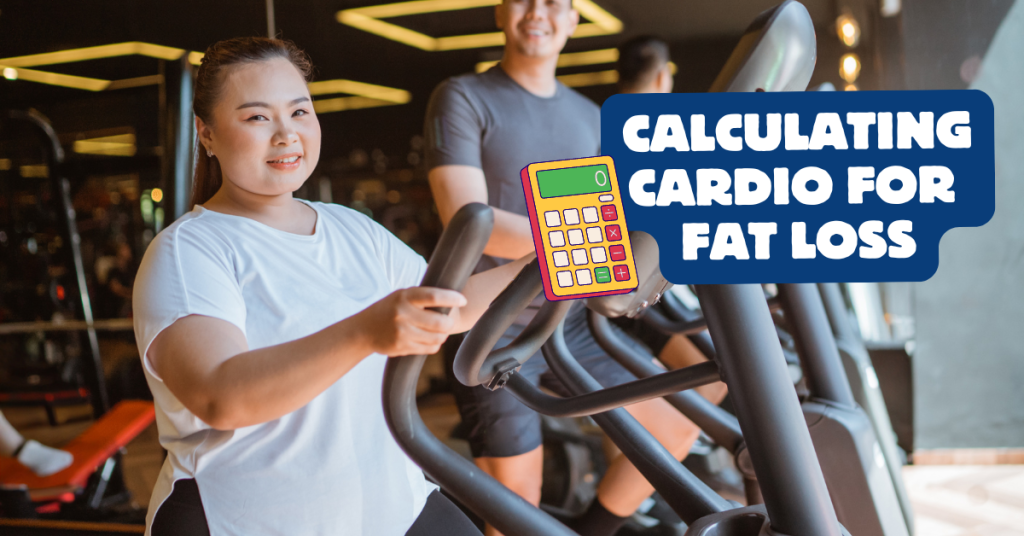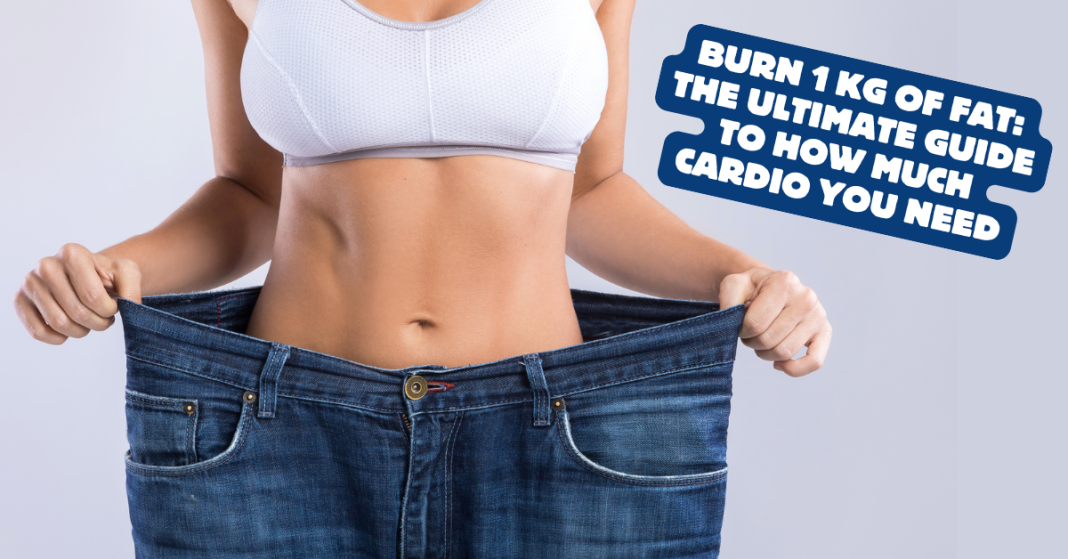Table of Contents
Losing weight is a common fitness goal for many, and cardio exercise is often the go-to strategy for shedding those extra kilos. But how much cardio do you really need to burn 1 kg of fat? The answer depends on several factors, including the intensity of your workouts, your body weight, and your diet. In this article, we’ll break down the science behind fat loss, how much cardio you need to burn 1 kg of fat, and some tips to help you maximize your efforts.
The Science Behind Fat Loss
Before diving into how much cardio you need to burn 1 kg of fat, it’s essential to understand the basics of fat loss. Fat loss occurs when you create a calorie deficit, meaning you burn more calories than you consume. This forces your body to use stored fat for energy, resulting in weight loss.
1 kg of fat is equivalent to approximately 7,700 calories. This means to lose 1 kg of fat, you need to create a calorie deficit of 7,700 calories through a combination of diet, exercise, and daily activities.

Calculating Cardio for Fat Loss
Cardio exercises, such as running, cycling, swimming, and rowing, are effective at burning calories and contributing to fat loss. The number of calories you burn during cardio depends on various factors, including your weight, the type of exercise, and the intensity of your workout.
Example: Running
Running is one of the most popular and effective cardio exercises for burning calories. On average, a person weighing 70 kg burns approximately 600 calories per hour running at a moderate pace (around 8 km/h).
To burn 1 kg of fat through running, you would need to run for about 12.8 hours (7,700 calories / 600 calories per hour). This might sound daunting, but remember, this can be spread out over multiple sessions.
Example: Cycling
Cycling is another excellent cardio exercise for burning calories. A person weighing 70 kg burns around 500 calories per hour when cycling at a moderate pace (around 16-20 km/h).
To burn 1 kg of fat through cycling, you would need to cycle for about 15.4 hours (7,700 calories / 500 calories per hour).
Example: Swimming
Swimming is a full-body workout that burns a significant number of calories. A person weighing 70 kg can burn around 700 calories per hour swimming at a moderate pace.
To burn 1 kg of fat through swimming, you would need to swim for about 11 hours (7,700 calories / 700 calories per hour).
Example: Rowing
Rowing is a powerful cardio exercise that also engages your upper body. A person weighing 70 kg can burn approximately 600 calories per hour rowing at a moderate intensity.
To burn 1 kg of fat through rowing, you would need to row for about 12.8 hours (7,700 calories / 600 calories per hour).
Factors That Influence Calorie Burn
While these examples provide a general idea of how much cardio you need to burn 1 kg of fat, several factors can influence your calorie burn, including:
- Body Weight: The more you weigh, the more calories you burn during exercise. A person weighing 90 kg, for example, will burn more calories than a person weighing 70 kg doing the same exercise at the same intensity.
- Exercise Intensity: Higher-intensity exercises burn more calories in less time. Incorporating intervals or increasing the intensity of your workouts can help you burn more calories.
- Fitness Level: As you become fitter, your body becomes more efficient at performing exercise, which may reduce the number of calories you burn. This is why it’s essential to keep challenging yourself with new workouts and higher intensities.
- Resting Metabolic Rate (RMR): Your RMR is the number of calories your body burns at rest to maintain basic bodily functions. People with a higher RMR will burn more calories throughout the day, even when not exercising.
Combining Cardio with Strength Training
While cardio is excellent for burning calories, combining it with strength training can enhance your fat loss efforts. Strength training builds lean muscle mass, which increases your resting metabolic rate, helping you burn more calories even when you’re not working out.
Additionally, strength training helps tone your body, giving you a more sculpted appearance as you lose fat. A well-rounded fitness routine that includes both cardio and strength training is the key to long-term fat loss and overall fitness.
Nutrition Matters
No matter how much cardio you do, you won’t see significant fat loss results without proper nutrition. Creating a calorie deficit through diet is just as important as burning calories through exercise.
Focus on a balanced diet rich in whole foods, such as lean proteins, vegetables, fruits, whole grains, and healthy fats. Avoid processed foods, sugary snacks, and excessive alcohol consumption, as these can sabotage your weight loss efforts.
For personalized nutrition advice and to ensure you’re on the right track, consider consulting with a professional, like the experts at Paphos Personal Training.
How to Stay Motivated
Losing 1 kg of fat through cardio requires consistency, dedication, and a positive mindset. Here are some tips to help you stay motivated:
- Set Realistic Goals: Break down your weight loss goal into smaller, achievable milestones. For example, instead of focusing on losing 1 kg, aim to burn 500 calories through cardio three times a week.
- Track Your Progress: Keep a workout journal or use a fitness app to track your cardio sessions, calories burned, and weight loss progress. Seeing your progress over time can be highly motivating.
- Mix Up Your Workouts: Avoid boredom by varying your cardio routine. Try different activities like cycling, swimming, or dancing to keep things interesting and challenge different muscle groups.
- Find a Workout Buddy: Exercising with a friend can make cardio sessions more enjoyable and hold you accountable to your fitness goals.
- Celebrate Your Successes: Reward yourself for reaching your milestones, whether it’s a new workout outfit, a relaxing massage, or a fun day out. Celebrating your achievements keeps you motivated and focused on your goals.
Cardio and Consistency Are Key
Burning 1 kg of fat requires dedication, consistency, and a combination of cardio, strength training, and proper nutrition. While the amount of cardio needed to burn 1 kg of fat may seem daunting, breaking it down into manageable sessions and staying consistent will help you reach your goal.
Remember, fat loss is a journey, not a race. Focus on making sustainable changes to your lifestyle, and you’ll see the results over time. Whether it’s running, cycling, swimming, or rowing, find the cardio exercises you enjoy, and make them a regular part of your routine.
For more personalized advice and support on your fitness journey, visit Paphos Personal Training, where our experts are ready to help you achieve your goals.
For additional tips on effective weight loss, check out this resource from the American Council on Exercise and the Mayo Clinic’s guide to weight loss.
Our FAQ’s
How Can I Stay Motivated to Do Enough Cardio to Burn 1 kg of Fat?
Staying motivated can be tough, especially when progress feels slow. We’ll share some practical tips and mindset shifts to keep you committed to your cardio routine, even on those tough days.
What if I Don’t Have Enough Time for Cardio? Can I Still Burn 1 kg of Fat?
We get it—life gets busy! Discover time-efficient cardio strategies and alternatives that still help you burn significant calories and stay on track with your weight loss goals.
Is It Possible to Burn 1 kg of Fat Without Losing Muscle?
Losing fat while preserving muscle is a common concern. Learn how to balance cardio with strength training and nutrition to achieve fat loss without sacrificing your hard-earned muscle.
What Should I Eat Before and After Cardio to Maximize Fat Loss?
Nutrition plays a huge role in how effective your workouts are. We’ll guide you on what to eat before and after your cardio sessions to fuel your body and enhance fat burning.
How Do I Know If I’m Burning Fat or Just Losing Water Weight?
Weight fluctuations can be confusing. We’ll explain how to differentiate between actual fat loss and temporary water weight changes, so you can better understand your progress.






